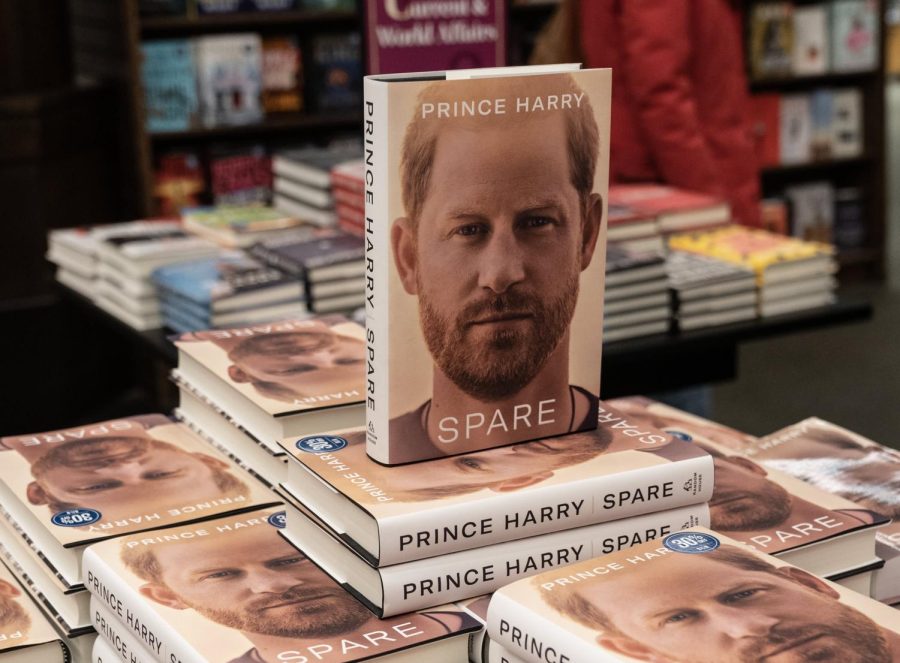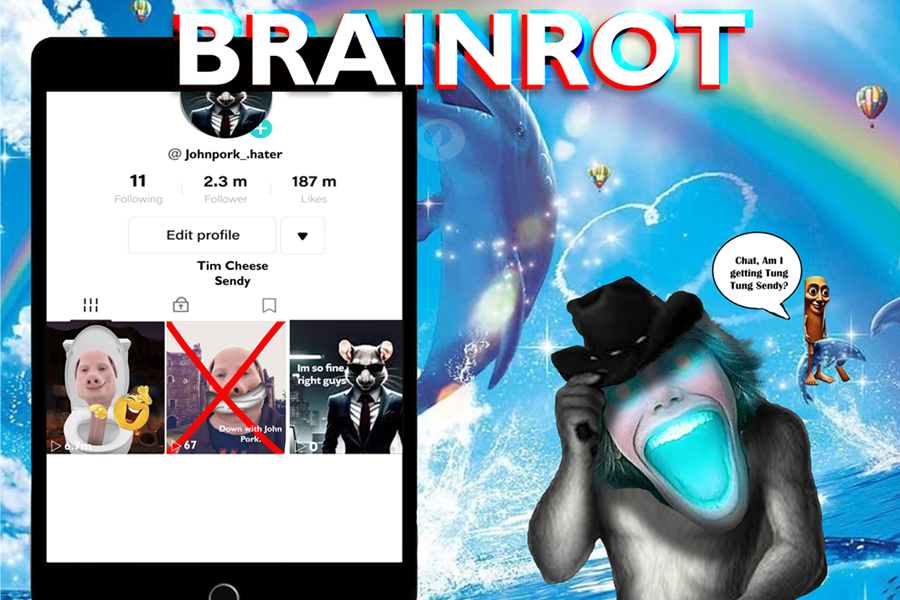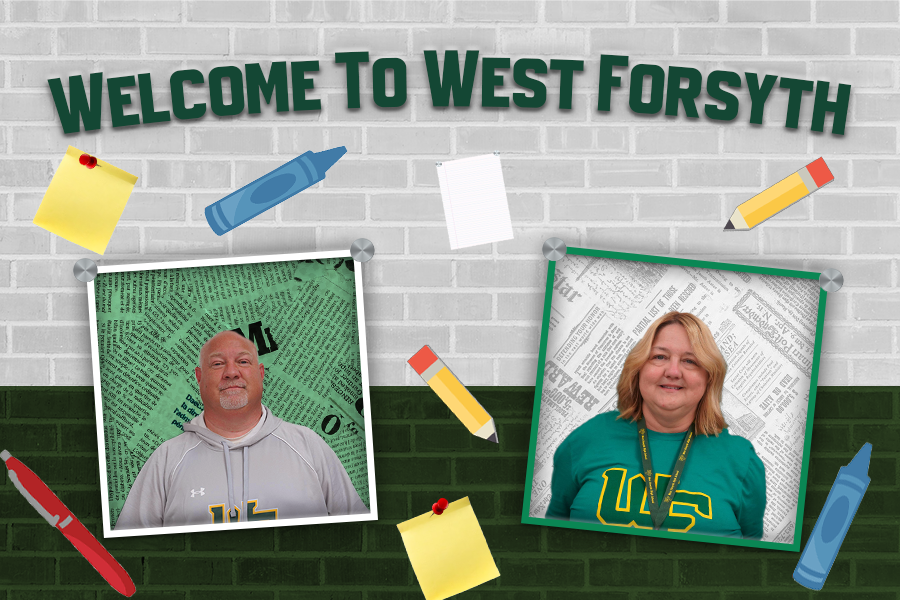A comprehensive review of “Spare” by Prince Harry
Prince Harry’s memoir sits on display at a bookstore.
February 9, 2023
Rating: ★★★/★★★★★
This review contains spoilers and mature subjects.
“The past is never dead. It’s not even past,” reads the opening quote, attributed to William Faulkner, in “Spare.”
The quote serves as the book’s thesis–a sentiment echoed by scorned movie supervillains and, most recently, Harry, the Duke of Sussex (he and Meghan retained their titles). At first glance, this seems like an archetypal, mysterious choice of words to hook the reader in. In reality, it’s a nod to the most well-known and traumatic event in Harry’s life: the untimely and tragic death of his mother, Diana, the Princess of Wales. Released last month, Prince Harry’s exhaustively descriptive and controversial memoir is dedicated to her.
In its barest form, “Spare” is a diary, a confessional at the altar of public opinion, a middle finger to the British tabloids. It’s divided into three parts that together form Harry’s story. While the first part focuses largely on Harry’s childhood and Diana’s passing, the second part details a turbulent period of military service and his journey into young adulthood. The third part spans from Harry meeting his wife, Meghan Markle, to the present. Readers are with Harry as he realizes his surviving family’s confusion regarding him and Meghan’s “departure” from the royal family; he introduces “Spare” as an explanation.
There aren’t necessarily any new revelations from the first section, which is a strong start to the book, although it’s weighed down by the heavy, imminent topic of his mother’s passing. The childlike frankness with which Harry describes his primary school days, his struggles with symptoms of ADHD and PTSD, and being bullied by the press for supposedly being “thick” makes the reader want to give the traumatized twelve-year-old a hug. With no invested parental figure present–King Charles doesn’t count–the future Duke and his “mates” get into all sorts of teenage-boy trouble, like smoking weed and giggling at “Family Guy.”
The second section begins to drag, as the Duke thought it wise to include needless breakdowns of military terms and events. Eschewing college in favor of armed service, formative characters come into play in the form of peers and instructors who act as guardians. Each one teaches him a life lesson–it’s so simply laid out that it’s almost artless, as it was intended, only adding to his sincerity. There are brief sections between active fighting where Harry returns home to the typical hijinks of British men in their mid-twenties. This second part particularly contains some of the most memorable (and viral, according to TikTok) moments–Harry allegedly killing 25 people in Afghanistan, doing coke and psychedelics, dressing up as a Nazi, suffering from a very intimate and unfortunate ailment after trekking through the North Pole… the list continues.
The final third of “Spare” picks up the pace; its fixture is Meghan Markle, and with her, the evil and depravity of the British press (“Fleet Street”). The Duke’s raw anger starts to rear its ugly head here like a self-defense mechanism as the venom toward his biracial wife leaves her feeling suicidal. His viewpoint becomes a bit more insular on family matters, as one can infer that information is being purposefully misrepresented. The unrelenting defiance throughout the section isn’t flattering.
The memoir is brutal and self-deprecating yet attractive and egotistical. This contrast doesn’t seem intentional; it results from the writer’s inexperience and raw desire to tell his story. Harry is captivated by that idea–it looks like he cannot bear the thought of not clearing his name, not saving his image. But he’s done the exact opposite–he’s pretty much solidified his status as an outcast. I compliment his bravery and honesty, the overarching, redeeming qualities of “Spare.”
In essence, the writing could be better. It’s surface-level but too explicit, not sublime, and reeking of immaturity.
Immaturity is a trait that’s been pinned to the Duke in an accusatory manner; it starts to show in “Spare.” Many events and anecdotes are underscored by a fundamental lack of acceptance for the system he was born into; it appears as if he never attempted to make the best of the “gilded cage.” But that doesn’t give him the agency to burn it to the ground, no matter how problematic the monarchy is.
Harry’s accomplishments are written in such a manner that tries to be humble, coyly revealing a hint of conceitedness and self-centeredness. Look at me. Look at how I helped this person. Look at how I did this, it says.
And then there’s Meghan. “Spare” doesn’t corroborate the press’s narrative of a manipulative witch–of course–but the pedestal it places her on is beyond unreasonable, not allowing leniency for many other female figures in the book. Meghan is probably a good person, but the torrent of perspectives presented about her is exhausting. The image Harry has created of himself, and Meghan, is not sitting right with me. Something feels almost… sinister about it. Their decision to make all the “wrong” maneuvers feels belligerent. However, it’s known that the press’s–and the public’s–standards are wildly out of proportion. Objectively, there are many things they could’ve done differently to result in a different outcome.
Harry is a few things the monarchy is not: non-religious and free-spirited. More than anything, Harry is Diana’s son with an inherent urge to rebel. They’re nearly too similar, and he theorizes that maybe that’s why he was destined to leave the “gilded cage.”
“Spare” is a raw, damning memoir of a man at war–in the literal and metaphorical sense. In addition to its many flaws, this earned it my three-out-of-five star rating. Relish your self-imposed exile, Harry.






